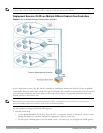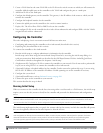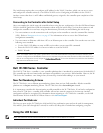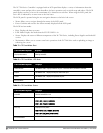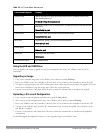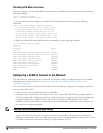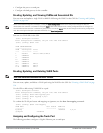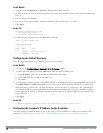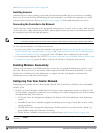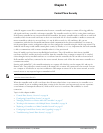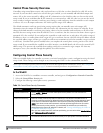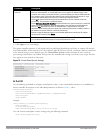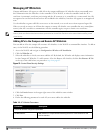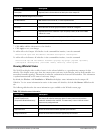
NOTE: After you configure or modify a loopback address, you must reboot the controller.
If configured, the loopback address is used as the controller’s IP address. If you do not configure a loopback address
for the controller, the IP address assigned to the first configured VLAN interface IP address. Generally, VLAN 1 is
configured first and is used as the controller’s IP address.
ArubaOS allows the loopback address to be part of the IP address space assigned to a VLAN interface. In the
example topology, the VLAN 5 interface on the controller was previously configured with the IP address
10.3.22.20/24. The loopback IP address in this example is 10.3.22.220.
NOTE: You configure the loopback address as a host address with a 32-bit netmask. The loopback address should be routable from
all external networks.
Spanning tree protocol (STP) is enabled by default on the controller. STP ensures a single active path between any
two network nodes, thus avoiding bridge loops. Disable STP on the controller if you are not employing STP in your
network.
In the WebUI
1. Navigate to the Configuration > Network > Controller > System Settings window.
2. Enter the IP address under Loopback Interface.
3. On this window, you can also turn off spanning tree. Click No for Spanning Tree Enabled.
4. Click Apply at the bottom of the window (you might need to scroll down the window).
5. At the top of the window, click Save Configuration. Note that you must reboot the controller for the new IP
address to take effect.
6. Navigate to the Maintenance > Controller > Reboot Controllerwindow.
7. Click Continue.
In the CLI
interface loopback ip address 10.3.22.220
no spanning-tree
write memory
reload
The controller returns the following messages:
Do you really want to reset the system(y/n):
Enter y to reboot the controller or n to cancel.
System will now restart!
...
Restarting system.
To verify that the controller is accessible on the network, ping the loopback address from a workstation on the
network.
Configuring the System Clock
You can manually set the clock on the controller, or configure the controller to use a Network Time Protocol (NTP)
server to synchronize its system clock with a central time source. For more information about setting the controller’s
DellPowerConnectW-SeriesArubaOS6.2 | User Guide TheBasicUser-CentricNetworks | 76



